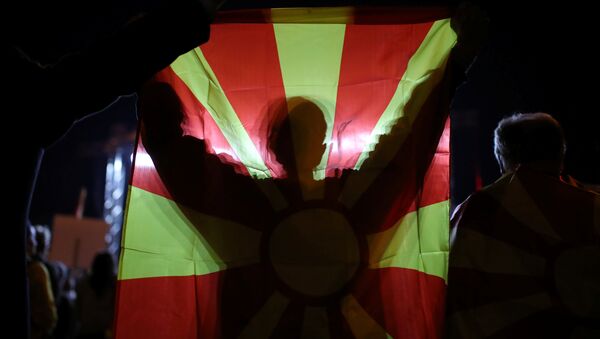Sputnik discussed Macedonia's name change with the University of Kent's International Conflict Analysis Professor Neophytos Loizides, who recently co-authored a book, "Mediating Power-Sharing: Devolution and Consociationalism in Deeply Divided Societies."
Sputnik: What's your take with regard to this current news, it's obviously a historic moment in the country's history, isn't it?
Neophytos Loizides: It is a historic moment, it's a historic moment for the region, we're not very used to peace processes, agreements, reconciliation succeeding in the Balkans. I think the bottom line is that two countries who have a very long historic identity conflict have found a way to start talking about it and found a way to start thinking about the future instead of the past.
READ MORE: Greece to Host NATO Aviation Training Center in Peloponnese — Defense Minister
Sputnik: How much support within the Albanian community does this particular change of name have? Is there any indifference towards the changing of the name? What's the current situation?
Neophytos Loizides: The two main political parties representing the Albanians were in favor. Historically the Albanians were not so preoccupied with the name issue. It's mostly between what we usually refer to in the historiography as the Slav Macedonians and the Greek Macedonians that have the main conflict. The Albanian Macedonians were comfortable being called Albanian Macedonians, so it was a question between the ethnic Slav Macedonians versus the Greek Macedonians.
In terms of the referendum, most of the data have shown that the support among Albanians, their participation in the referendum was around 40%. It showed that a lot of people didn't vote simply because of indifference. The normal orientation among Albanians is: let's decide to resolve this issue because that would allow us to join the European Union, we're going to have more opportunities to migrate to Europe with if we want to, we're going to have financial aid.
So they were in favor in principal in terms of their representatives, and those who are representing them in the parliament also voted in favor of the constitutional change. The question, though, is whether this will essentially stay between the two main parties who are involved in the negotiations; that is the Greek Macedonians who claim their heritage from the province, versus the ethic Slav Macedonians who think that the name Macedonia belongs to them because of cultural reasons and because of the right to name themselves the way they prefer to.
Sputnik: Can you explain to us a little bit about the significance this decision has for Greece?
Neophytos Loizides: For Greece it is very important; it resolves a long-standing dispute, it allows Greece to turn the page and present itself as a peacemaker in the Balkans, the Greek geopolitical position becomes more valuable within the European Union. A lot of people would see this conflict as antagonistic between the West and East, between European Union and Russia. I don't agree necessarily with this dimension, I think it's important for two countries to come to resolve this dispute.
READ MORE: NATO Chief Urges Greece to Ratify Name Change Deal of Former Yugoslav Republic
It's not so much about geopolitics, and I think that the geopolitical aspect was slightly exaggerated in most analysis that have been made so far. I think it was a peace process driven by two (groups of) leaders; the leaders of Greece and the leaders of Northern Macedonia and essentially we ended up having something that was born out of the region successfully and for the benefit of everybody.
Sputnik: There's a lot of commentators who are making assessments for how long it could take before Macedonia's bid to join NATO and the European Union are accepted following the name change, what are your particular thoughts on that specific question?
Neophytos Loizides: Yeah, people a betting on when the arrangement, the final arrangements will be made. My expectation is sometime around January, but as you have seen from the vote, in the parliament we have a very marginal support for the constitutional amendment. A single MP or two MPs might be able to derail the whole process, so it is very fragile on the North Macedonian side.
Sputnik: An interesting question with regard to the actual turnout of the voters, why did the Macedonian government decide to go ahead with constitutional change given and despite the fact that the earlier vote didn't get the necessary turnout of voters? It seems strange that the actual Macedonian public didn't want to actually turnout in volumes to actually put their point of view with regard to this vote, have you got a point of view on that as well?
Neophytos Loizides: Exactly, it's very confusing, my bottom line is, as a social scientist, a political scientist, especially somebody coming from the UK, referendums are not very good decision mechanisms; they rarely give what most people would expect as a result, but more fundamentally I think the long-term interest of the country, of North Macedonia, will be served by this agreement, that's number one.
The second is that the referendum was slightly inconclusive because it had more than 90% 'yes' support but then, as you have said, it didn't meet the 50% requirement to be valid, and what might happen in the meantime is probably new elections, where we might be able to see a renewed mandate or I believe that if those opposing the agreement feel that they're not consistent with decisions to change the constitution, not consistent with the will of the people, they can also themselves initiate a referendum and this time it will be binding, the only difference is that the 'yes' vote will abstain, so it will be the reversal of the constitutional rules, this time around.
The views and opinions expressed by the contributors do not necessarily reflect those of Sputnik.


